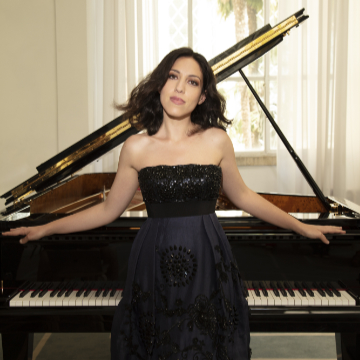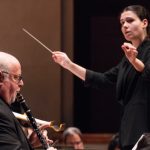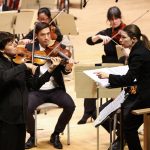William Ford | 10 OCT 2025
Beatrice Rana was born in Copertino, Italy, in 1993. Raised in a family of musicians, she performed with an orchestra for the first time at just nine years old. A student of Benedetto Lupo in Monopoli and Arie Vardi in Hannover, she is now considered one of the leading pianists of her generation. Winner of the Montreal International Competition and silver medalist at the Van Cliburn, Rana has performed with the world’s foremost orchestras and recorded extensively for Warner Classics. Her interpretations of Bach’s Goldberg Variations and Schumann’s Piano Concerto have been widely praised. Her Neapolitan charm and quick wit make her not only a commanding performer but also a delight to talk with.
William Ford: You come from a musical family. Where were you born, and what was that early environment like?
Beatrice Rana: I was born in southern Italy, in Lecce — if Italy is a boot, Puglia is the high heel. Both of my parents are pianists, so I grew up surrounded by music. My younger sister, Ludovica, rebelled against all the pianos in the house and became a cellist! She’s now a professional musician, and we often perform together.
WEF: Do you remember your first experience at the piano?
Rana: Not really. The piano has always been there — even before I was born. I can’t remember a single day of my childhood without it.
WEF: When did you realize you wanted to make it your career?
Rana: That happened much later. I started playing at three and a half, but I attended a scientific high school focused on math, chemistry, and physics. When my classmates began applying to universities, I had to ask myself if I really wanted to be a pianist. The answer came quickly: I couldn’t imagine living without music.
WEF: Were your parents your teachers?
Rana: No — they were very careful not to teach me directly. They wanted to keep music from becoming a family battleground! So I started in group classes with other children and later studied privately with other teachers.
WEF: You travel constantly. Do you enjoy that part of your life?
Rana: I do, but it has two sides. It’s a privilege to discover new places, people, and cultures — that’s a gift of this profession. But sometimes I hardly realize where I am. You move from city to city, flight to flight, with little time to explore.
WEF: Do audiences differ from place to place?
Rana: Completely! That’s what I love — even with globalization, audiences still have national personalities. The first time I played in the U.S., I was amazed by how generous and enthusiastic people were — almost primitive in the best way. In Europe, audiences can be more reserved, more intellectual. And in Japan, the applause is so organized — it begins and stops in perfect unison! Each country has its own character.
WEF: Are some audiences harder to reach?
Rana: Perhaps the ones with the richest musical traditions. Playing Beethoven in Germany, for example, is always a statement — it’s like performing sacred music for its own congregation. Expectations are high.

Beatrice Rana (credit: Simon Fowler / Warner Classics)
WEF: Do you ever walk offstage thinking a performance didn’t go well?
Rana: Of course — many times! That’s normal. It doesn’t mean I didn’t give my best. We’re human; sometimes the hall, the piano, or even the audience can make things difficult. But I never go to bed disappointed. I just think, “Today wasn’t great — tomorrow will be better.” The stage isn’t a judge; it’s a place where you grow.
WEF: Is the problem usually technical or musical?
Rana: Musical. Technical things can vary slightly, but they’re not the main issue. Music, however, is unpredictable — it lives and changes each time you play.
WEF: What kind of acoustics do you prefer?
Rana: I like halls that “hug” the sound — warm, resonant spaces, often made of wood. I don’t enjoy overly dry acoustics that make everything analytical. I want to feel embraced by the sound.
WEF: You’re returning to Spivey Hall soon. What makes that venue special for you?
Rana: I love Spivey Hall! I’ve played there twice before, and the experience has always been wonderful. The staff and the audience are so kind, and the piano technician is excellent. Once, I missed a recital because my flight from San Francisco was canceled, and the Spivey team was incredibly understanding — they helped me reschedule, and we made it work beautifully. It’s a gem of a hall with ideal acoustics.
WEF: Do you have to adjust your playing to different halls?
Rana: Always. It’s like speaking to a small group versus a large crowd — you naturally change your tone and projection. Ideally, I have someone in the hall who can give me feedback, but often I judge from the stage myself. With experience, it becomes instinctive.
WEF: You’re performing Prokofiev’s Sixth Sonata and Romeo and Juliet. What draws you to that music?
Rana: Prokofiev’s music is incredibly powerful — both brutal and tender. The Sixth Sonata, the first of his war sonatas, was written in 1945. It even includes a marking col pugno — to play “with the fist”! It reflects a world in turmoil but also in search of beauty. I pair it with Romeo and Juliet because, to me, war begins not only between nations but within families, when love gives way to pride and misunderstanding. Playing these together reminds me that choosing peace, even in small ways, still matters.
WEF: And Tchaikovsky?
Rana: That’s to bring some beauty amid all that intensity! His music restores balance.
WEF: Who are your piano heroes?
Rana: Martha Argerich was my childhood idol — I still adore her. From the past, Horowitz, Richter, and Clara Haskil. And of course, being Italian, Arturo Benedetti Michelangeli and Maurizio Pollini.
WEF: Do you have a special connection to any composer?
Rana: For me, the answer is always Bach. His music is endlessly inspiring — spiritual yet deeply human. He was the father of more than twenty children, and you can feel both his faith and his humanity in his work. The combination is perfect.
WEF: You’ve also become active as an artistic director.
Rana: Yes — I founded my own festival in Lecce, my hometown, and now I’m also the artistic director of the Spoleto Festival in Italy. They’re very different: Spoleto is large and multi-disciplinary, while my festival is intimate and focused on chamber music. But both share one goal — presenting great music without prejudice. I like to pair famous composers with neglected ones, and renowned artists with those who deserve to be heard. Quality is what matters.
WEF: Do you handle the business side too?
Rana: [Laughs] Thankfully, no! I focus on programming — others deal with budgets and logistics. I’d rather talk about music than money.
WEF: Thank you, Beatrice — you’ve been wonderfully open and thoughtful.
Rana: Thank you! It’s been such a pleasure. I can’t wait to return to Atlanta and see everyone at Spivey Hall again. ■
Watch the full interview on YouTube:
Beatrice Rana: Upcoming North American Recitals
Dates and Venues
- 29 Oct 2025
Severance Hall
Cleveland, OH – USA - 01 Nov 2025
Spivey Hall
Morrow, GA – USA - 02 Nov 2025
Chicago Symphony Center
Chicago, IL – USA - 04 Nov 2025
Salle Bourgie
Montréal, QC – Canada - 06 Nov 2025
Kimbell Art Museum
Fort Worth, TX – USA - 08 Nov 2025
Jordan Hall
Boston, MA – USA - 10 Nov 2025
Perelman Theater, Ensemble Arts Philly
Philadelphia, PA – USA - 12 Nov 2025
Stern Auditorium, Carnegie Hall
New York, NY – USA
EXTERNAL LINKS:
- Beatrice Rana: beatricerana.it

Read more by William Ford.
RECENT POSTS
 Dallas Symphony’s assistant conductor rises to the challenge in a program of premieres and familiar works • 25 Nov 2025
Dallas Symphony’s assistant conductor rises to the challenge in a program of premieres and familiar works • 25 Nov 2025 Tyshawn Sorey Trio and Sandbox Percussion merge forces in Durham for an immersive night honoring jazz drummer Max Roach • 24 Nov 2025
Tyshawn Sorey Trio and Sandbox Percussion merge forces in Durham for an immersive night honoring jazz drummer Max Roach • 24 Nov 2025




.png)